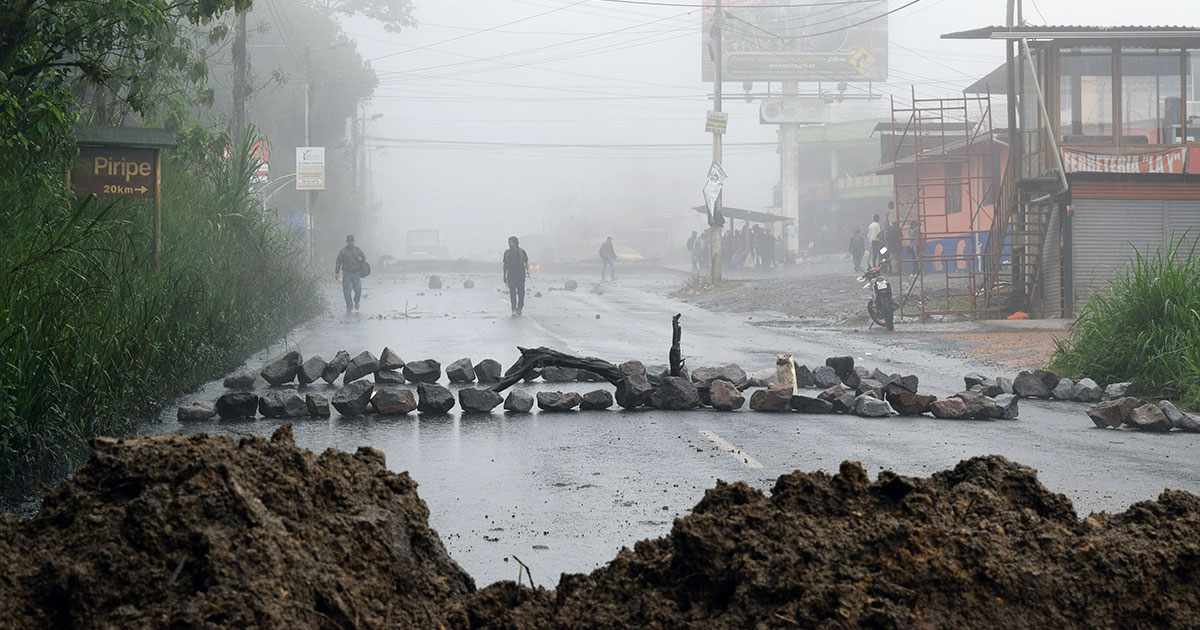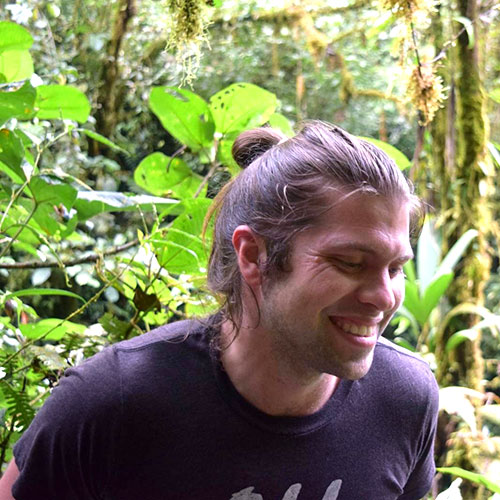LET’S DO LUDDISM
★ ★ ★ ★
BLOCKING THE ROAD

Image by Andrea Zambrano Rojas
By Cory Massaro
I’d heard that activists had “closed the roads,” but I didn’t understand what that meant.
I had set out from Quito with a group of friends, headed for Mindo, a city 100 kilometers away. This is usually a two-hour bus ride, but no buses were running that day. We caught a cab to see how far we could get.
About 80 kilometers into the journey, we reached standstill traffic. We paid the driver for taking us that far, then got out and started walking. We trundled uphill. Thick exhaust emanated from the trucks of apparently uninformed optimists and choked the already-thin mountain atmosphere.
Then the rain started—a daily occurrence in that sector of the country—and the air became clean. The highway narrowed as it crossed through a minuscule town, and there we reached the blockade: a steep, two-foot-tall dirt rampart stretching across the pavement. A gap in the rampart welcomed foot traffic. Three or four hundred meters away stood another rampart. In between, lines of stone blocks had been laid carefully across the road. Here and there, people had filled tires with twigs and tinder and set them on fire, ever-burning. The burning rubber sent fetid black plumes into the air, and the flames never sputtered, as though they’d reached a truce with the rain. All four elements had been convoked.
* * *
In early June 2022, the Confederation of Indigenous Nations of Ecuador (CONAIE – Confederación de Naciones Indigenas de Ecuador), submitted a list of ten demands to the Ecuadorian government. They called, broadly, for the government to stabilize the prices of essential goods (e.g. gasoline and domestically-produced foodstuffs); to uphold existing programs that provide education, health care, and economic assistance; and to halt the neoliberal administration’s disastrous efforts to privatize public services. The government responded with a frankly insulting promise to increase the minimum wage by five dollars monthly, and little else. On June 13th, CONAIE called a general strike until its demands were met. The government responded by detaining Leonidas Iza Salazar, president of CONAIE. On June 17th, after Iza’s conditional release, it was announced that activists would close major roads throughout the country, and that the strike would last until demands were met.
* * *
In the stretch between the ramparts, people partied. Music blared. One of our group took out her camera. Across the street, a woman in a bright wool poncho cheered and shook a staff, so we took her picture. She raised her fist, palm forward, and we raised ours in turn. A few dozen people, probably most of the town, sheltered under a tin awning. They shouted and laughed; they cooked heaping pans of food over grills and open flames. Four or five police officers stood silently to one side. They looked lonely, paltry, and waterlogged in their slick black rain gear.
Walking on, we caught up to a woman and a young boy going the same way we were. So began one of those unquantifiable, non-transactional highway exchanges that I think must always have happened, as long as people have been people. “Do you need water?” “A snack?” “Can we carry that for you?” “My brother has a car, he’s up a ways and can drive you.” Thick forest sheltered both sides of the road. Our companion was from the coast; she commented that, where she was from, you wouldn’t go hungry on a walk like this—there’d be fruit pouring from the trees.
On this few-kilometer stretch, cars rushed from the blockade to the next town. We stuck our thumbs out but no one slowed to give us a lift.
Travelers came from the other direction, too. We stopped to exchange news with a couple of men—“How’s the traffic on that side?” “And on the other?” “How long have you been walking?” A young guy came bounding downhill, holding big bags of fruit or something. Club music pumped from his portable radio. He yelled with a smile how no one would offer him a ride; we laughed and agreed.
* * *
As of this writing, the strike continues unabated. Indigenous communities lead the effort, joined by workers’ unions, artists, and political activists. The government has announced a state of exception, granting the police broad license to infract the rights of individuals and institutions. Notably, the police have occupied cultural centers in the city of Quito, ostensibly to use as bases of operations but with the clear intent to dissipate organizers’ efforts.
When it comes to news about the strike, mainstream media are useless. Here in Ecuador, as elsewhere, the press lies about leftists: that’s a known fact. One learns where the marches are, or how to donate food, or what mutual aid efforts are going on, solely through osmosis. A friend tells you on the street or hits you up on WhatsApp. You can’t just show up at the community kitchen—you have to know someone. At night, I hear police sirens, but they’re not as loud as the parties and chatter.
As a native of the U.S., where an individualist ethos prevails, I think it’s this that astounds me most—the resilience and power of face-to-face, unmediated community relationships. Legislators have even brought before Ecuador’s national assembly a serious motion to impeach the president. It just might work—collective action in Ecuador has accomplished similar feats in the past.
* * *
The Luddiate Bestiary
in defense of dragons
Sometimes the dragon
isn’t an iron-scaled monster
but a tired old sleeper under the hill
and her three throats happen to be of iron
and emanate steam,
and sometimes her treasure
isn’t a gold hoard
but the dull fact that you can drink the water
and sprinkle crops and wash the kids’ faces
with the steam and the water,
and when the armored dragon-slaying men come
to slit her three iron throats with their sharp iron
sometimes it’s okay to cheer
as the tired sleeper cracks the hill and drowns them
in the drinkable water.

Cory Massaro is a native of Ohio, U.S.A., now at home in Quito, Ecuador. He spends his time learning languages, writing, playing music, coding, and propagandizing. He actively opposes materialism, consumption-as-cultural mandate, and all forms of hegemony. He is in favor of small, robust communities and gently destroying hierarchies wherever he goes. His fiction and poetry draw on the grievances he has stored in his heart since working in technology; his dearest hope is to predict accurately how egalitarian, worker-centered societies will revive the oral tradition to weather the climate wars.
























0 Comments